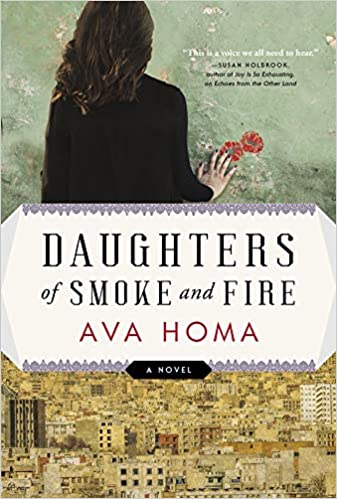3,474 Total views, 1 Views today
By Goran Sabah
Few novels grab your attention from just the first line. Daughters of Smoke and Fire by Ava Homa is one such captivating novel.
“A woman alone on the mountain at dusk.”
This first line weighs so much that you have no choice but to continue reading. In this clause — not even a complete sentence — Ava manages to present the reader with a character, a place and a time. The words ‘woman alone’ imbue the setting with strength.
Daughters of Smoke and Fire is painfully honest in its narration; it relates unique and valuable stories that are all too often ignored by Western publishers.
The setting in Ava Homa’s debut novel is akin to Orwell’s 1984 dystopian world, only the controlling system, the suffering, the dictatorship, and the politics in Daughters of Smoke and Fire are real. To broach such a sensitive topic is testament to Ava’s bravery. As Chia in the novel says, “I should remember that words are sinful . . . thinking is a crime, writing is enmity against God and talking is terrorism.” And Leila says, “It is not our homeland that is colonized. Our self-worth is hijacked too.”
The novel is a multi-themed narrative. It covers the suffering of women under religion, a theocratic state and patriarchy; the agony of the largest stateless nation; the politicization of religion; cultural and social taboos; family values; and ethnic cleansing policies. ‘Rich’ is perhaps the best word to describe the novel in all its aspects.
Other reasons make the novel a must-read. Most of the story is narrated by Leila in the first person, past tense. One part is told by Chia, also in the first person but in the present tense. Some parts are in the third person, past tense. Since the simple present tense is used for repetitive actions, it would have been more interesting had the novel been written in the simple present tense because the sufferings Ava documents still exist today.
The language of the text is another one of its merits, in addition to the themes and the style of narration. The language is simple yet rich, clear yet deep. The philosophy of language is in its simplicity. It is hard to convey such complex issues in a soft language, yet Ava has mastered this well.
This fast-paced novel is a quick read with its short chapters, paragraphs and sentences. The flow is quick, with a wonderful twist in each of the few chapters. The twists make readers fall in love with the story and its characters.
This story teaches about the Kurdish nation, the struggle of its people, their culture, food, nature, daily family life, personalities and sufferings. It even introduces Kurdish names such as Chia, Shiler, Alan, Hana, Hawram, Hawraz, Karo, and Ferhad.
Leila, suffering from religious restrictions and forced to wear the hijab since she was six years old, gives up on her dream of becoming a filmmaker to stand up for her brother who disappears in Tehran. A Kurdish-Canadian-Persian friend tries to help her. She is full of hope and full of pain.
Ava shows us the strength of Kurdish women, although many of them commit suicide by self-immolation. Leila says, “ . . . Kurds had female rulers and governors in the eighteenth century, at a time when that was unheard of among Persians and Turks, but now we have such high rate of suicide by fire. What happened to Kurdish women?”
Powerful skills of narration are necessary in order to cover four decades of such complex matters in a single novel. Each sentence, paragraph, page and chapter tell the reader something new. I never felt bored reading it. As Leila says, “tragedy cannot be weighed,” but this novel tells you what a real tragedy is.
*Goran Sabah has PhD in journalism (major) and advanced fiction writing (minor). He has published three novels in Kurdish and English: The Leader Aorta (2005), Fear and Hatred (2010), The Statues (2014). A Fulbright Scholar and award-winning journalist and writer, Goran has translated more than 20 books from English to Kurdish.

